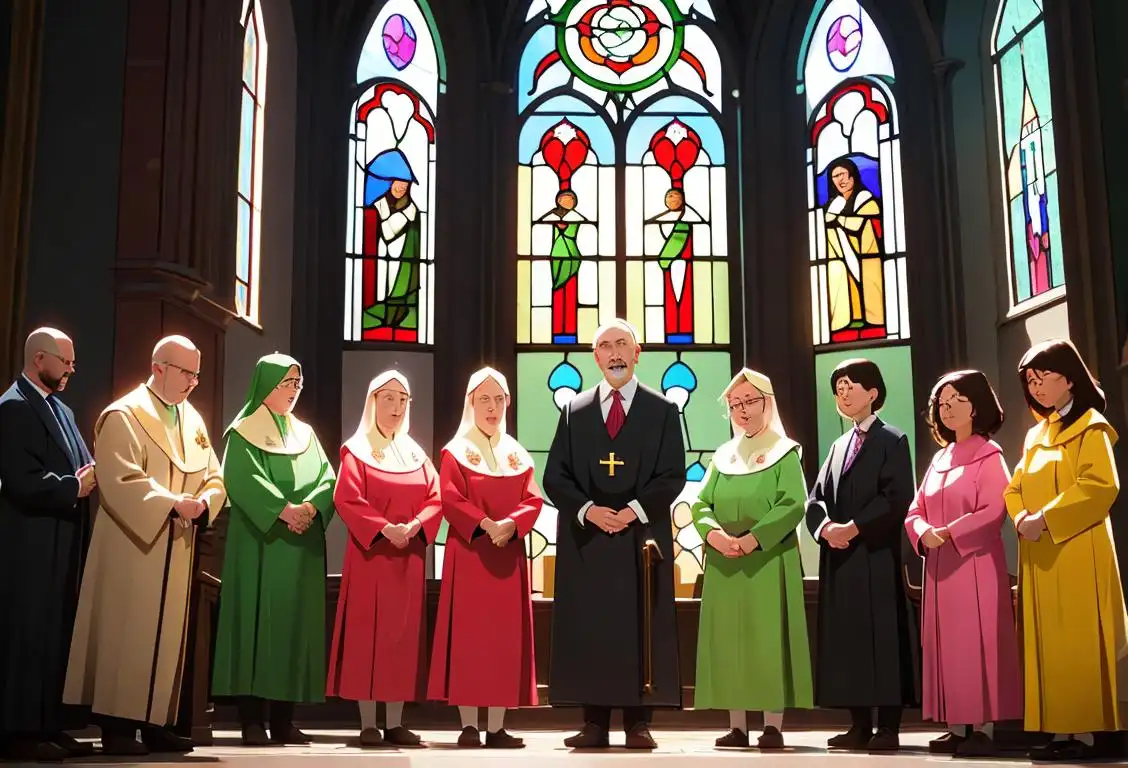National Baptist Day

Welcome to National Baptist Day, a day dedicated to celebrating the rich history and traditions of the Baptist community! Whether you're a devout Baptist or just curious about this religious denomination, get ready to dive into an article that will enlighten and entertain you.
When is Baptist Day?
It's national baptist day on the 16th January.
The Origins of National Baptist Day
On this special day, we commemorate the formation of the Baptist church and recognize the contributions of Baptist believers throughout history. Baptists, known for their emphasis on individual freedom and personal faith, have a long and fascinating story to tell.
The roots of the Baptist movement can be traced back to 17th-century England when dissenters sought religious freedom and advocated for adult baptism. John Smyth, considered one of the founders of the Baptist tradition, baptized himself and others in 1609, forming the first Baptist congregation. From there, the movement spread across different parts of Europe and eventually made its way to the United States.
The Baptist denomination has grown and evolved over the centuries, with numerous branches and associations emerging. Today, there are millions of Baptists around the world, each with their unique beliefs and practices.
How to Celebrate National Baptist Day
There are countless ways to celebrate National Baptist Day and show your appreciation for the Baptist community. Here are a few ideas:
- Attend a Baptist church service: Experience the uplifting worship, heartfelt sermons, and vibrant community spirit that are hallmarks of Baptist worship.
- Learn about Baptist history: Dive into books, documentaries, or online resources to gain a deeper understanding of the Baptist faith, its historical milestones, and influential figures.
- Connect with fellow Baptists: Reach out to Baptist friends, family members, or colleagues and engage in meaningful conversations about your shared beliefs and experiences.
- Participate in community service: Many Baptist churches are actively involved in charitable initiatives and community outreach programs. Consider volunteering your time or donating to a Baptist-led initiative that aligns with your passions.
Did You Know?
In the spirit of fun and learning, here's a fascinating fact about the Baptist tradition: Did you know that the Baptist World Alliance, a global organization representing Baptist communities, was founded in 1905? It serves as a platform for dialogue, collaboration, and fellowship among Baptists of diverse backgrounds.
History behind the term 'Baptist'
1609
The First Baptists
In 1609, a group of English Separatists who were unhappy with the Church of England formed a new congregation in Amsterdam. Led by John Smyth, this group became known as the first Baptists. They believed in adult baptism, rejecting the practice of infant baptism common in other Christian denominations.
1609
Origins in England
The term 'baptist' traces its roots back to the early 17th century in England. In 1609, a group of English separatists led by John Smyth broke away from the Church of England and established the first General Baptist Church in Amsterdam. These early Baptists believed in the idea of baptism by immersion and rejected infant baptism.
1609
Emergence of the term 'Baptist'
The term 'Baptist' originated in England in the year 1609. It was used to describe a group of religious dissenters who believed in the practice of adult baptism by total immersion. This belief was in contrast to the prevailing practice of infant baptism in the Church of England. The term 'Baptist' referred specifically to their distinctive practice of baptizing believers only and not infants.
1609
The Birth of the Baptist Movement
The origins of the term 'Baptist' can be traced back to the year 1609 in Amsterdam, Holland. It was during this time that a group of English Separatists, led by John Smyth, broke away from the Church of England and formed the first Baptist congregation. This marked the birth of the Baptist movement, which emphasized the belief in adult baptism and the autonomy of the local church.
1600s
Emergence of Early Baptist Beliefs
During the early 1600s, a group of English Puritans began questioning the practice of infant baptism and instead advocated for adult baptism. They believed that baptism should be reserved for individuals who were old enough to make a conscious decision to follow Jesus Christ. This belief led to the emergence of early Baptist beliefs, with the term 'Baptist' being used to describe those who held these views.
1609
Step One: Origins in Amsterdam
In 1609, a group of English religious dissenters fled to Amsterdam in search of religious freedom. This group, led by John Smyth, became known as the 'Separatists' and sought to reform the Church of England. It was during this time that the term 'baptist' emerged, as they believed in adult baptism by immersion, a departure from the traditional infant baptism of the Church of England.
1609
Formation of the first Baptist church.
In 1609, the term 'Baptist' first emerged when a group of English separatists, led by John Smyth, formed the first Baptist church in Amsterdam. They believed in adult baptism and rejected the practice of infant baptism, which was common in their time. This marked the beginning of the Baptist movement and the term 'Baptist' became associated with those who believed in this unique form of baptism.
1609
The birth of the term 'Baptist'
The term 'Baptist' originates from the year 1609 when a group of English Separatists in Holland formed a new religious movement. They believed that baptism should be reserved for those who are old enough to make a conscious decision to follow Jesus, rather than practicing infant baptism as the state church did.
1638
Step Two: Formation of Particular Baptists
In 1638, the first Baptist church was established in Bristol, England. This marked the beginning of the Particular Baptist movement, which emphasized the Calvinist doctrine of predestination. Unlike the Separatists, the Particular Baptists believed in a restricted form of baptism, limiting it to those who professed faith in Jesus Christ.
1638
First Baptist Church in America
In 1638, the first Baptist church in America was established in Providence, Rhode Island by Roger Williams. Williams, a Puritan minister who was expelled from the Massachusetts Bay Colony due to his views, founded the First Baptist Church as a place where religious freedom and the principle of separation of church and state were upheld.
1638
The Publication of the First Baptist Confession
In 1638, a Baptist minister named Thomas Helwys published the first Baptist Confession of Faith, known as 'A Declaration of Faith of English People Remaining at Amsterdam in Holland.' This confession solidified the core beliefs and principles of the Baptist movement, including religious freedom, separation of church and state, and the authority of the Scriptures.
1638
Establishment of Roger Williams' Baptist church in Rhode Island.
In 1638, Roger Williams, a prominent early Baptist theologian, established the first Baptist church in North America in Providence, Rhode Island. Williams was an advocate for religious freedom and his church became a refuge for people seeking religious liberty. This step played a crucial role in solidifying the presence of Baptists in the Americas and further popularized the term 'Baptist' as a distinct religious group.
1639
Formation of the Particular Baptists
In 1639, another group of English Baptists emerged, known as the Particular Baptists. They held distinct theological beliefs, emphasizing the concept of 'particular redemption,' which was the idea that Christ's sacrifice was intended only for a select group of individuals. The Particular Baptists formed the first Baptist association.
1638
Formation of the General Baptist movement
In 1638, the General Baptist movement was formed in England. The General Baptists were one of the first organized groups within the wider Baptist tradition. They held a theological belief in Arminianism, which emphasized free will and the possibility of falling away from grace. The General Baptists also advocated for religious freedom and the separation of church and state.
1638
The Establishment of the First Baptist Church in the United States
In 1638, Roger Williams, a former Puritan who had been banished from the Massachusetts Bay Colony for his dissenting views, founded the First Baptist Church in America in Providence, Rhode Island. This marked the establishment of the first Baptist church in what would become the United States.
1638
Formation of the First Baptist Church
In the year 1638, a Baptist church was officially established in Providence, Rhode Island, marking the formation of the first Baptist church in America. This church, known as the First Baptist Church of Providence, was founded by Roger Williams, a prominent theologian and advocate for religious freedom. The establishment of this church played a significant role in promoting the spread of Baptist beliefs throughout the American colonies.
1707
The Formation of the Baptist Union of Great Britain
In 1707, the General Assembly of Particular Baptist Churches was established, uniting various Baptist associations under the name 'The Baptist Union of Great Britain.' This marked a significant step in the organization and recognition of the Baptist movement as a distinct entity within the religious landscape of Great Britain.
1707
The Formation of the Baptist Union of Great Britain and Ireland
In 1707, Baptist churches in Great Britain and Ireland came together to form the Baptist Union. This organization aimed to promote cooperation and fellowship among Baptist churches and served as a platform for discussing theological developments within the Baptist tradition.
1770
Early Baptist Influence in America
The term 'baptist' made its way to America in the 17th century through the influence of Baptist missionaries. However, it wasn't until the mid-18th century, around 1770, that Baptist churches began to gain significant influence in the American colonies. Prominent figures like Shubal Stearns and Daniel Marshall played a crucial role in promoting Baptist principles and establishing Baptist churches.
1701
Founding of the Baptist faith in America
The Baptist faith spread rapidly across America in the 18th century. In 1701, the Philadelphia Baptist Association was founded, marking the beginning of many Baptist associations and conventions. This enabled Baptists to form a cohesive organization and advance their faith across different states.
18th century
Expansion of Baptist churches through evangelism and missionary work.
During the 18th century, Baptist churches experienced significant growth as they engaged in active evangelism and missionary work. Baptist missionaries traveled to various parts of the world, including Africa, India, and the Caribbean, spreading their beliefs and establishing new churches. This expansionary phase helped Baptist congregations grow in numbers and influence, contributing to the recognition and spread of the term 'Baptist' as a global religious identity.
1689
Step Three: The London Baptist Confession
In 1689, the London Baptist Confession was published, providing a systematic statement of faith for Baptist churches. This confession, also known as the Second London Baptist Confession, outlined the essential beliefs and practices of Baptists. It solidified the theological foundation of the Baptist movement, emphasizing the autonomy of the local church and the priesthood of all believers.
1700s
Growth and Expansion of Baptist Denominations
Throughout the 1700s, Baptist churches experienced substantial growth and expansion, particularly in the American colonies. The First Great Awakening, a religious revival movement that swept across the colonies, played a significant role in attracting new converts to Baptist churches. As a result, various Baptist denominations began to form, each with its distinct theological emphasis and practices. This period marked the diversification and proliferation of Baptist beliefs and churches.
1644
Publication of the First Baptist Confession of Faith
The First Baptist Confession of Faith, also known as the 'London Confession,' was published in 1644. It served as a foundational document for Particular Baptists, another branch of the Baptist movement. The Particular Baptists held a Reformed theology, emphasizing the concepts of predestination and limited atonement. This confession of faith outlined their beliefs and practices and helped solidify the identity of the Particular Baptists.
1814
The Formation of the Triennial Baptist Convention
In 1814, the Triennial Baptist Convention was formed in the United States. This convention aimed to bring together Baptist associations and churches from across the country, promoting cooperation and collaboration in mission work, education, and theological discussions. The convention played a crucial role in the expansion and influence of the Baptist movement in America.
1814
Formation of the Triennial Convention.
In 1814, the Triennial Convention was established as an organizational body for Baptist churches in the United States. This convention aimed to promote cooperation among Baptist congregations, support mission efforts, and address doctrinal concerns. The establishment of such a convention further solidified the Baptist identity and provided a platform for sharing resources and ideas among Baptists across the country.
1707
Formation of the Baptist Union of Great Britain
In 1707, the Baptist Union of Great Britain was established. This union brought together various Baptist churches across England and Wales, creating a centralized organization. The Baptist Union aimed to facilitate cooperation among Baptist churches, promote education and mission work, and provide a platform for Baptist ministers to come together for mutual support and fellowship.
1800s
Baptist Missionary Movement
In the 19th century, the Baptist missionary movement gained considerable momentum. Baptist missionaries embarked on global expeditions to spread their faith and establish Baptist churches in various parts of the world. One notable example is the formation of the Southern Baptist Convention in 1845, which became one of the largest Baptist denominations in the United States. The Baptist missionary movement significantly contributed to the international spread and influence of the Baptist faith.
19th Century
Step Four: Baptist Expansion in North America
During the 19th century, Baptist churches experienced significant growth in North America. Influential leaders like Adoniram Judson and Lott Carey played pivotal roles in promoting Baptist missions and establishing churches around the world. This period also witnessed the rise of different Baptist denominations, each with its own theological nuances and organizational structures.
1814
Formation of the Baptist World Alliance
In 1814, representatives from Baptist churches in various countries came together to form the Baptist World Alliance. This international organization aimed to foster unity among Baptists globally and promote cooperation in mission work and theological education. Today, the Baptist World Alliance represents millions of Baptists worldwide.
1814
The Founding of the Triennial Convention
In 1814, Baptist leaders from various states in the United States gathered in Philadelphia to establish the Triennial Convention, later known as the American Baptist Missionary Union. This organization aimed to coordinate missions and evangelism efforts among Baptist churches, both domestically and internationally.
1814
The Second Great Awakening
The Second Great Awakening, a religious revival movement in the early 19th century, greatly influenced the growth of the Baptist faith. Baptist preachers played a significant role in this movement, attracting large crowds with their powerful sermons and emphasizing the need for personal conversion and salvation.
1845
The Southern Baptist Convention
In 1845, Southern Baptist churches that supported slavery split from the Triennial Convention and formed the Southern Baptist Convention. This divisive move highlighted the growing tensions within the Baptist community over the issue of slavery.
20th century
Diversity and expansion of Baptist denominations.
The 20th century witnessed a significant diversification of Baptist denominations. Different theological perspectives and cultural contexts led to the formation of various Baptist groups such as Southern Baptist Convention, American Baptist Churches, and National Baptist Convention. This diversification showcased the adaptability and flexibility of the term 'Baptist' to encompass a wide range of doctrinal and organizational differences.
1845
The Southern Baptist Convention
In 1845, the Southern Baptist Convention was established in Augusta, Georgia, in response to the growing tension surrounding the issue of slavery. The convention aimed to support the practice of slavery in a biblical context, leading to a split from the main Baptist convention. The Southern Baptist Convention grew to become the largest Protestant denomination in the United States.
20th Century
Step Five: Ecumenical Engagement and Social Justice
In the 20th century, Baptists actively engaged in ecumenical dialogues with other Christian denominations, seeking unity and cooperation. Furthermore, Baptists became increasingly involved in social justice initiatives, addressing issues such as civil rights, poverty, and peacemaking. This commitment to social transformation continues to be a significant aspect of Baptist identity in the modern era.
20th Century
Diversity and Denominationalism
Throughout the 20th century, the term 'baptist' continued to encompass a wide range of theological perspectives and denominational affiliations. Different Baptist groups emerged, including Southern Baptists, American Baptists, and many others, each with their own variations in practice and doctrine. This diversity within the Baptist tradition reflects the decentralization and autonomy that characterizes Baptist churches.
1814
Formation of the Triennial Convention in the United States
In 1814, the Triennial Convention was formed in the United States. The convention was a response to the need for cooperation and unity among Baptist churches in America. It provided a forum for discussion, decision-making, and mission coordination. The Triennial Convention played a significant role in advancing the Baptist movement in the United States and supporting missionary efforts both domestically and internationally.
20th Century
Social and Civil Rights Activism
During the 20th century, many Baptist churches actively engaged in social and civil rights activism. Prominent Baptist leaders, such as Martin Luther King Jr., played pivotal roles in the American civil rights movement. Baptist churches became platforms for advocating equality, justice, and desegregation. The Baptist faith's commitment to individual freedom and equality has had a profound impact on the civil rights movement and continues to shape social activism in various communities.
1845
Formation of the Southern Baptist Convention
In 1845, the Southern Baptist Convention was formed as a result of a split from the Triennial Convention over the issue of slavery. The Southern Baptist Convention became one of the largest Protestant denominations in the United States and remains influential to this day.
20th Century
Expansion and Diversity
During the 20th century, the Baptist movement experienced significant growth and diversification. New branches and associations formed, such as the National Baptist Convention, the Conservative Baptist Association, and the Baptist World Alliance. There was also a rise in theological diversity, with different Baptist groups adopting varying positions on issues like women's ordination and LGBTQ+ rights.
20th Century
Global Spread and Diverse Practices
Throughout the 20th century, the Baptist movement experienced significant global expansion and diversification. Baptist churches spread to various parts of the world, adapting to local cultures and embracing a wide range of worship styles and practices. Today, there are Baptist denominations and organizations in numerous countries, making a significant impact on the global religious landscape.
1845
Formation of the Southern Baptist Convention
In 1845, the Southern Baptist Convention (SBC) was established. It originated as a splinter group from the Triennial Convention due to regional differences, specifically related to slavery. The SBC became the largest Protestant denomination in the United States and exerted a significant influence on American culture and politics. Today, the SBC remains one of the major branches of the Baptist tradition.
Did you know?
Did you know that the Baptist World Alliance, a global organization representing Baptist communities, was founded in 1905?Tagged
community celebration history religion faithFirst identified
16th January 2020Most mentioned on
16th January 2020Total mentions
15Other days
Baptist Day
Indigenous Persons Day
Train Day
Youth Day
Hoe Day
Technology Day
Rum Day
Video Game Day
Bourbon Day
Vodka Day








